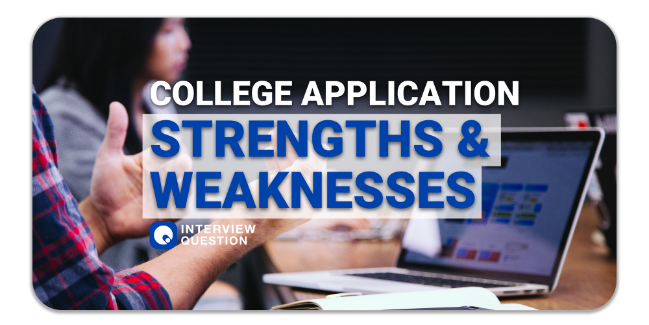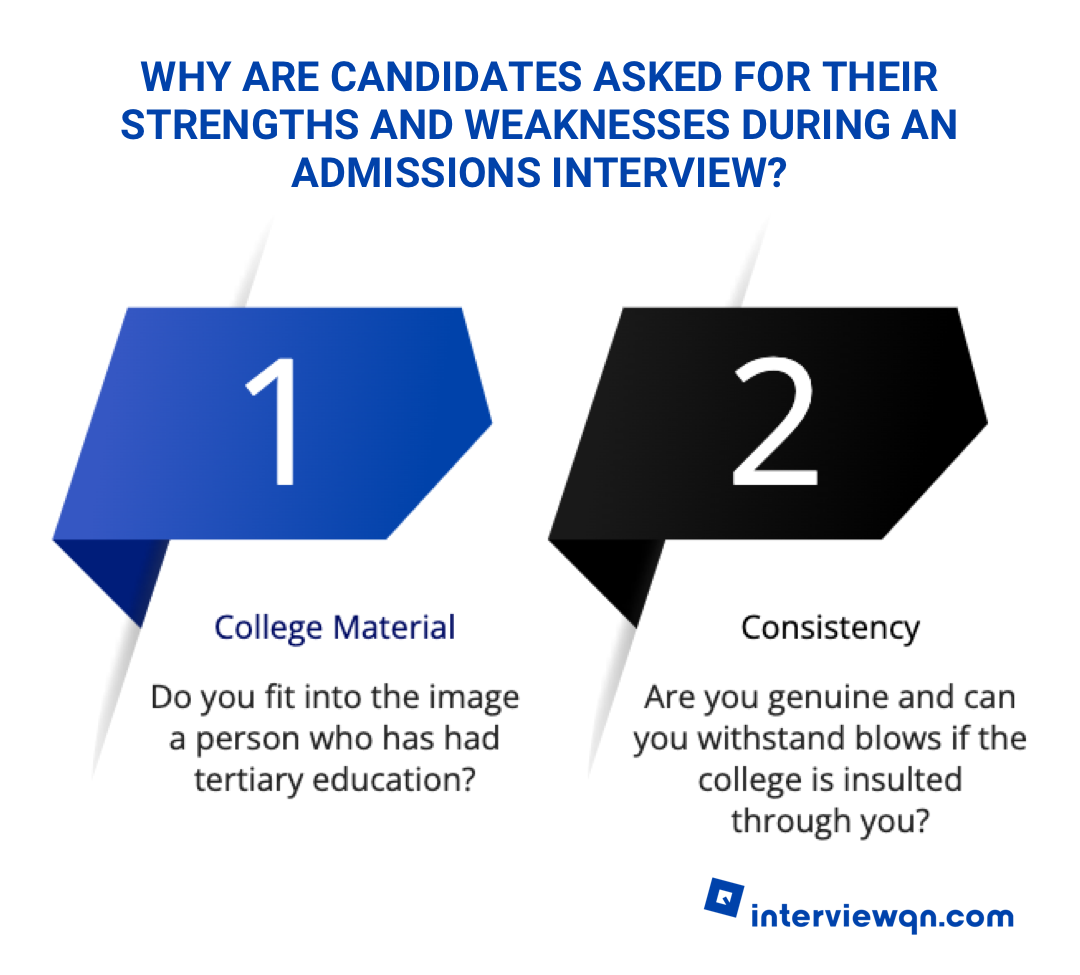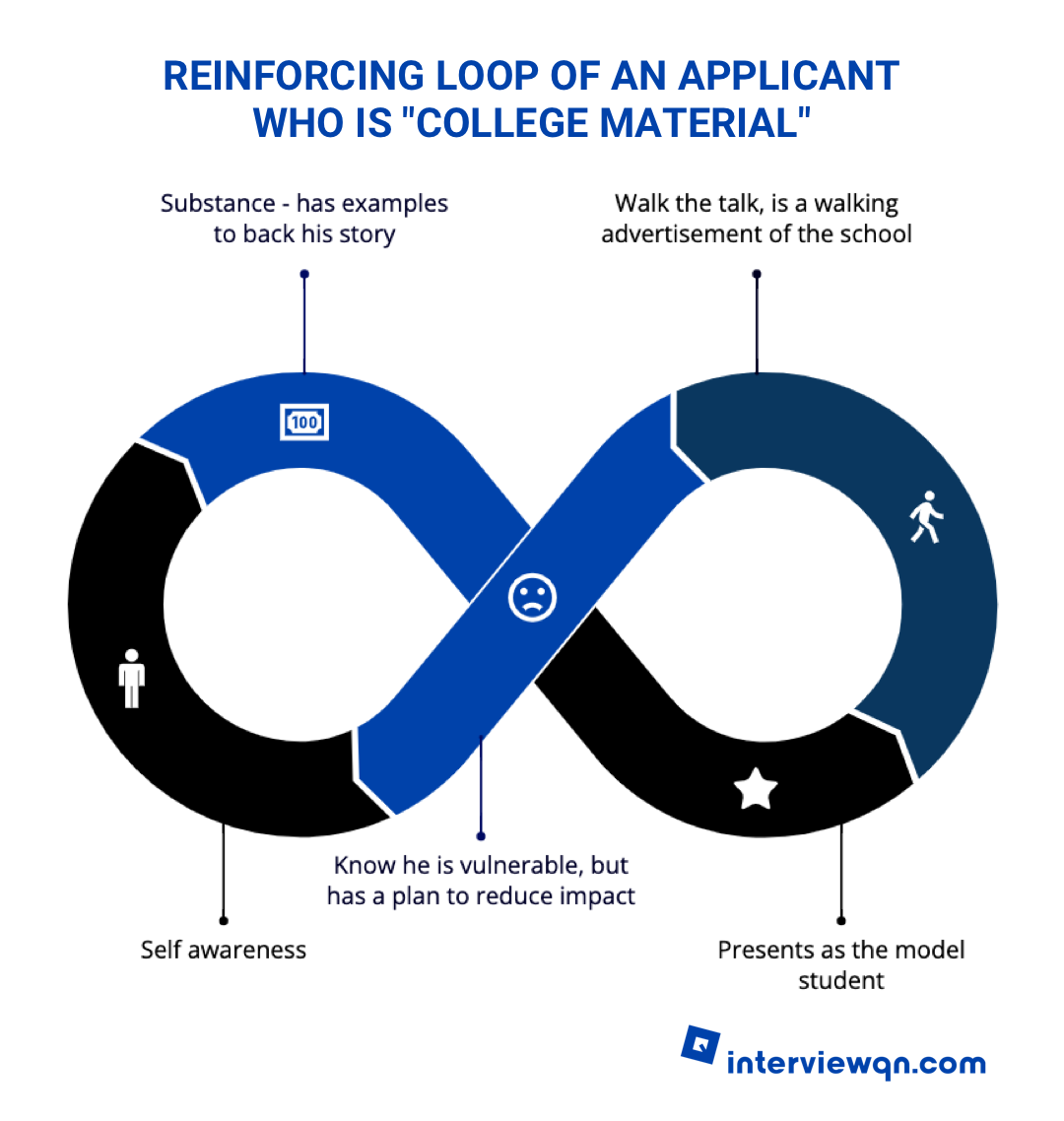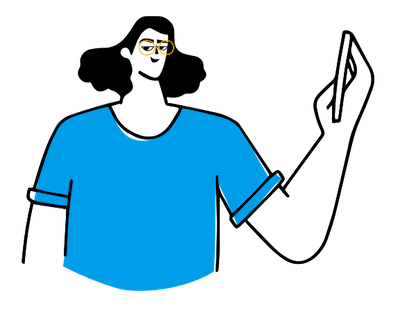College Interview: What Are Your Strengths and Weaknesses?
• Purpose & Intent of Question • Knowing & Determining Them • Examples of Your Own Strengths & Weaknesses You Will Want to Use

When asking any question related to strengths and weaknesses, college admission interviewers have two objectives in mind.
- Experts say that during a college interview, you can expect to be asked about your strengths and weaknesses.
- You might be surprised to find that the interviewer is genuinely interested in understanding your self-awareness and ability to reflect on yourself.
- It is important to prepare beforehand by identifying your strengths and weaknesses and being able to articulate them clearly.
- When discussing your strengths, experts suggest focusing on qualities or skills that are relevant to the college experience, such as leadership abilities or strong communication skills.
- While it may be tempting to exaggerate or fabricate strengths, experts advise against doing so as interviewers can often see through insincerity.
- When discussing weaknesses, it is crucial to demonstrate self-awareness and show how you have actively worked towards improving those areas.
- Instead of simply stating a weakness, experts recommend providing examples of situations where you faced challenges related to that weakness and how you overcame them.
- Interviewers appreciate honesty but also want reassurance that you are proactive in addressing any shortcomings.
In this article, we break down the interviewer's approach and angle of attack questioning. This helps in understanding why they ask certain questions.

Then we share how you can respond effectively to this classic interview question on your strengths and weaknesses.
Let's get started.
Purpose 1: To Determine If You Are College Material
Interviewers want to know if you have the substance.
A strong candidate will be able to present and distinguish herself with the ability to provide and cite specific examples of how they have used their strengths and weaknesses in the past to their benefit. She should be able to articulate naturally and clearly these points in the interview.
We are talking specifically about candidate quality here.

This recount of your previous experience (even if you lack industry and work experience) becomes a convincing factor to persuade interviewers that you can continue to maintain this sort of standard when admitted to their school.
They want people who can uphold their qualities, brand and wear their attitude like a shining star. An ideal candidate will have strengths that show externally - they walk the talk and become the walking advertisement of the school.
Join our free email newsletter!
Do some soul searching: Who are you?
Identify your strengths. Things that make you shine.
Identify your weaknesses. Stuff that make you look not so good.
- Be honest. Who are you - not as you or from your perspective. Imagine there was someone walking on the street. A stranger. How would you introduce yourself? How do you sell your uncommon strengths and put a positive spin to your weaknesses, as if it were a really important interview? You want to convince him.
- You will want to talk about what makes you, you. And then link those positive traits and work experience (including internship and short stints) to how you are the model student that will be the best fit for them.

- Sharing the motivations as the drivers of your life; what makes you tick and how they are your life substance, essence of life will be very convincing and it also humanizes you.
Related:
- What is a college interview like?
- The best advice to help you get accepted into college (short and sweet version)
- Strengths in a college interview can include showcasing your academic achievements and extracurricular involvement.
- Highlighting your leadership skills and ability to work well in a team can also be seen as strengths.
- Demonstrating strong communication skills, both verbal and written, is highly valued by interviewers.
- Showing enthusiasm for the college and its programs can make you stand out positively.
- Weaknesses should be discussed honestly but framed in a way that shows self-awareness and growth potential.
- Discussing weaknesses related to time management or organization may indicate areas for improvement.
How you address your vulnerabilities
The second part about the candidate's substance is about how they address their own vulnerabilities. Weakness that would cause difficulties for them in classes or on campus, and also your plans for what she does to get around them have to be addressed early on.

Interviewers are people too - they understand that you are not infallible. There's no need to deny or conceal. You should not tell your interviewer that you have no weaknesses - that's impossible. You know you have problems, and you know what your problems are, you got to go equipped with a game plan.
- Memorize: Commit to memory a few examples at your fingertips for you to use in conversation. Having a couple ideas prepared can reduce your anxiety if the interviewer probes you in real-time.
- Strategize: Mention your "least weak" weakness (here's how). You still want to be competitive amongst your peers from other brand name schools vying for the same, scarce things out of the interview, so you may want to be seen as strong despite your flaws.
- Prepare: Share how you have prepared to be upfront, and the steps you have thought through to improve on your weakness to adapt to the new education environment.
It's not easy to prepare good examples of your strengths and weaknesses ahead of time; it requires alot of honesty and introspect. Plus, you may want to be seen as unique and strong amongst a large pool of applicants. Ultimately, they make a call on whether you will fit in or not through the interviews, in order to filter the lesser candidates out of the admissions process.
Self-awareness: You should be able to know yourself well enough. Consider consulting a trusted friend who has known you for some time.
- Get a friend to run through mock interviews, trial runs.
- Get him to whack you hard in difficult Q&A sessions to get you ready.
- Get him to do practice interviews at the same time of the day (morning or afternoon) depending on the actual time of the interview, so you are acclimatised.
And best of all, you are more likely to get honest and non-superficial feedback that will actually be helpful to you.

Or get a career coach whose professional responsibility is to guide and advise you on topics relating to college, work and jobs. This is the final step to the reinforcing cyclical loop of an applicant who is "college material".

Purpose 2: To Determine A Candidate's Consistency
The second persuasive point the interview admission assessment panelists have is that they are looking for consistency in candidate's responses.
How you approach and respond to all their queries will play a big part in shaping their opinion of you.

Interviewers look for genuine people who can withstand the test of time. They do not want a student who can "wing it", or be masked by a pretense. You can look really strong today and convince your interviewer your strongest strength is out of this world. But later on maybe in the first year, this student ends up being a farce and a laughing stock.
Why? Because even after you are in your 30s or 40s, you still carry their "Harvard" brand and will be able to introduce yourself in any meeting or interview by leveraging the fame of the school.
How you carry the school's brand & image
- When you speak to people and introduce yourself.
- When others see your profile on Facebook or Instagram and recognize you as their student.
- When acquaintances come to know you through a friend of a friend who attended the same classes as you.
Students of good schools need to be consistent in their image, in school, after class and also years after they graduate. Interviewers want their students to wear their name like a proud badge of honor.
It is about the collective image.
What you should show is that you perform well throughout the interview session - start, end and middle.
Back to the current interview context.
What should you do to show consistency?
- First, aim to always give quality, logical answers. This signals a student who has put considerable thought (they are thinkers) and can speak well (and they are also do-ers).
- A special strength is only special when it is relevant. So next, link your responses to the context, opinions or facts which were mentioned in the earlier part of the interview. So if the interviewers glossed over the fact that there are 3 libraries on campus and the central reference library has the most seats, you can re-connect this point. Example below.
"I spend my free time in sports and I am very involved in sailing. But sailing is a very time-consuming endaveour and I try extremely hard to manage my time well. As I am most productive when I see others studying really hard too, I love the fact, like you mentioned earlier, that Cornell has 3 libraries and the central library is really close in proximity to the on-campus lodging which makes commuting less stressful and time-saving."
- Making logical references also show that you have been attentive in the interview. And the fact is that people only listen when it concerns them; so being admitted must mean something to you! And you aren't just applying for fun or taking them as a backup plan.
- Be elaborate and detailed in your self-presentation. Descriptive explanations are better at convincing the listener at what and why the story you are telling is true. Speak more, give examples, use more sentences and time in the interview and your written application to share the specifics.
- Finally, if you have family heritage or your friends come from this same school as you are applying to, you can show consistency. The people in your life are from the same school and they are your community. You are a part of their community and it should be only right to admit one of theirs in.
Ultimately, being consistent gives you a better chance of scoring a place in admissions. If you do score low against your competition, however, at the very best, you may only be placed in the very long line on the waitlist.
The above are some practical guidelines when preparing your answer to this interview question. Though there is not a right or wrong answer to this question, but if you come prepared with a skeleton script to follow, then this strength and weaknesses interview question won't make you that worried.
What Are My Strengths?
Your strengths are the abilities or qualities you have that will help you accomplish the things you want. These strengths are usually instrumental in achieving your goals not just academically, but socially and professionally as well. Your strengths are not always easily identified, so you need to determine your best ones.
Reuse the content from your essay (which you previously submitted) as inspiration and leverage on the best points to begin an interview with a ban.
How Can You Determine Your Strengths?
It may be difficult for some to figure out, especially if the interviewer hasn't told you what they are looking for in an answer. If there is a particular area of expertise or subject that you excel at, then use it as an example.
Know that you can also use what is called the STAR method of answering this question, helps you keep the interview topic solely focused on your strengths and it works well in both formal and casual discussions.
The STAR method is a method of identifying your strengths and how to best use or benefit from these in college.
STAR is an acronym.
- Situation
- Task
- Action
- Result
Use each of the STAR components to explain how you utilized your strengths in the past and how they helped you achieve a goal or satisfy a need.
An example where STAR is used in an interview
Here's an example of applying STAR to this question: I have always been a strong student. For me, success in classes comes easily because I'm able to read well and take full advantage of my study skills. Give the interviewer the correct impression and vibe of a really strong candidate.
Why use STAR?
By using the STAR method, you can come up with multiple strengths that you find useful in your everyday life. Your strengths should be specific, measurable and achievable. Interviewers can accurately judge you and utilizing the STAR framework will help you increase the volume of content you share so their understanding has both breadth and depth.
In understanding you, they are looking for qualities that will benefit the college experience. They extract these stories, keywords and emotions to give you a score and rank you against a benchmark of other candidates.
When you say you know your strengths, you should know how you can determine exactly what each of your strengths is and how they can help you in the next stage in college.
How to Find my Strengths?
Your strengths can be the things that you like doing and are good at, like singing or playing an instrument. These strengths can also be unrelated to your main field of study.
If you are preparing for a job interview, you should also identify your strengths and weaknesses.

Finding your strengths in your daily life
Strengths do not have to be academically related. Life is not just school.
For example, a student who plays football might decide to play that sport even if he intends on studying medicine in college as a physician because he is good at it, excels, and even won trophies in competitions.
Join our free email newsletter!
Where to find your strengths
Here are 6 ideas to find your strengths:
- Think about what you do when you are free. In any 3 hour block of free time, how do you allocate it? What activities do you do?
- What do friends like about you? Ask them for their opinion.
- Your grandparents watched you grow up. They know you possibly better than you know yourself with the wisdom through age.
- Take an online quiz. They are not always accurate and more often than not generic, take a shot.
- Look up your Safari or Chrome search history. The websites you visit the most are the places you spent most of your time in, so you've probably honed skill or two out of it.
- Check your Discord, Telegram and WhatsApp groups. As long as you are still a participant in the group, it shows you still have some interest in it and you weren't too bothered by the notification popups or bubbles. The group title will reveal your strengths and interests.
Help these interviewers who have been trapped in the room for hours to see the light and that you have a good fit for the school they work at.
How to Find Strengths Which Are Relevant
The more obvious your strengths are, the easier it is to answer this question. Some easy examples include being a top student in a subject or having been involved in extra-curricular activities that you did well in. However, doing well in ranked PUBG matches and having a small crowd of followers on TikTok doesn't seem to do much good in elevating your candidacy.
There should be evidence that your strengths have been instrumental in meeting your goals, regardless of what your goals are.
Link irrelevant strengths to goals, and support it with evidence.
Examples of Irrelevant Strengths Made Relevant With Evidence
- A strong PUBG player: I enjoy the thrill of competition and I am serious in my aim to be the regional best player. Having a target to work towards excites me, even if I play for leisure and my goal is a personal goal.
- Having a crowd of followers on TikTok: Attention is the new currency of today, not money or time. Many companies pay well to attract eyeballs but my followers have been earned rather than "sponsored", and the attention I have is far more genuine and the people are way more engaged. There is no excuse for the fact that I like attention but the public has the right to give their attention to genuine creators who are worth their attention - not just watching them just because advertisers are willing to shell out the dollar. Being genuine is my strength, my audience likes it and I like having them around me.
Make sure there is relevance between the strength mentioned and the job (or school in this case) you apply for.
How to Increase Relevancy of Broad/Generalized Strengths
Narrow your strengths. Make them specific.
Broad strengths have little meaning, whereas a strength narrowly-termed and context-specific has way more value.
- For example, do not say that you are a good leader only when your teammates all agree to it and have said so.
- Instead, base it on your accomplishments and use examples of how these leadership skills were effective in helping you achieve an objective or fulfill a need in the past.
- When speaking about your strengths, it's important to illustrate vividly with details to increase their relevancy.
- Make sure they are something you, not just anyone else, can identify with.
Examples of Strengths that College Applicants Would Want to Have
- Curious and upbeat, always open to new ideas with the ability to take criticism and criticism of others.
- Picks things up quickly and is good at following instructions. Loves to be creative and takes pride in her work.
- Hopes to use the confidence she has gained from being in the orchestra to be a part of other teams on campus.
- Aspires to become a better public speaker, and learn how to make speeches in front of crowds.
- Likes to bring up a change she sees for the better. Is always ready to help her community.
- Enjoys assisting others. Loves being helpful, and she is known for her good work ethic and dedication to helping her friends and classmates.
- Strong determination and initiative. Loves to be helpful and is well known for being reliable, friendly, and open to new ideas.
- Successful in her work which helps put her at ease in social situations.
- Contributes by creating positive change on campus through custom events, clubs she's involved with, or helping others with their problems.
Use your connections and social networks to your advantage (present them as strengths)
What Are My Weaknesses?
Though your weaknesses are not usually the first thing that comes to mind when you think about your strengths and accomplishments, you should be able to list some of these as well. You may feel scared when talking about such weaknesses as you may percieve that the negativity would hurt your candidacy. However, this is a good way to show that you are human and not always an ideal candidate but you are striving to become one by putting in the effort and thought.
Talking about your weakness positively gives you a chance to better explain how you have dealt with these issues in the past. It allows college interviewers, as well as interviewers who you may meet later on in your career, to see that you are growing professionally. Weaknesses are not an admission of guilt! You are in fact positively identifying your flaws, showing conscious awareness of your problems.
Again, your effort and unwavering conviction are some of the things your interviewer really wants to see from candidates during the interview.
When sharing on your weakness, you should refrain from oversharing. Weaknesses are things that can hurt your chances at a successful interview, so you should only answer to what's being asked and offer no more than that.
Ultimately, keep your thoughts clear and well organised.
- First, answers should be full and satisfy the question intent so that it convinces the interviewer enough not to ask you a subsequent question, yet impresses them.
- There is a second option; Strategically offering up weaknesses that aren't directly relevant to the interviewed scope will reduce the harm it brings. The irrelevancy of the weakness makes it appear that this moot point would not affect your "on-the-job" or "in-the-school" performance. As such, choosing this kind of weakness will not look weak at all in the overall scheme of things.
Why Do Colleges Want to Know My Weaknesses?
For most colleges, weak points are less important than your strengths. Most applicants have both. In fact, it's probably best to list them in a more general way (but if you can spin and switch a weakness into a strength, it will be much better) so that it doesn't seem as if they are weaknesses but rather that you can also make an effort and make changes in areas in which you wish to improve upon.
The assessors want to know if you are aware of your weaknesses, and if you do know and identify with them if you have done anything to rectify or improve on areas for improvement where you may have been less than perfect.
If you find something that you are not good at or need to work on then this is an excellent opportunity to make it part of your strengths as well. It shows that you are willing and capable of improving yourself in those areas.
Should I Share My Biggest Weakness or Smallest One During an Interview?
The biggest weakness is something that will lead to a major point of failure. It's your biggest flaw and could seem to be a deal-breaker for an assessor. It may be a major handicap and you may be perceived as having a big weakness that cannot be fixed easily with effort and time.
The smallest weakness is more of a quirk in your character or some trait that seems to annoy other people. These are the things that you may be most familiar with that make you stand out but do not lead to any obvious major downside or downfall.
Comparing between the biggest and the smallest weakness, you may decide that the latter is a lot easier to look past and let you off the hook.
Sharing your biggest flaw and not being able to cover for it is a big early sign that you will end up failing an interview. Avoid at all costs!
Examples of Weaknesses that College Applicants Would Want to Say:
- She has a lot of trouble making small talk with new students and finds it difficult to start conversations with classmates and teachers.
- She struggles to express herself in writing because she is not good at articulating her thoughts when she is nervous. Struggles with public speaking as a result of her shyness and fear of failure (If you are like this, then you maybe disadvantaged in group interviews, compared to individual interviews). She is not as confident in herself as she would like to be. Her goal is to become more comfortable in front of large groups of people.
- She has difficulty being organized, which causes her to be late sometimes. This results in disciplinary consequences for her, but it has since motivated her to try harder at being on time or even early.
- Her mind wanders too much in class because she has trouble staying focused and paying attention, and it is sometimes difficult for her to complete all of the required work in class. She has gotten better over time by being more independent and motivated.
- Easily distracted by meaningless things on the internet, likes to watch YouTube videos that are unrelated to what she is doing. However, she has learnt to limit consumption and use the knowledge from her hobbies to make progress at school.

